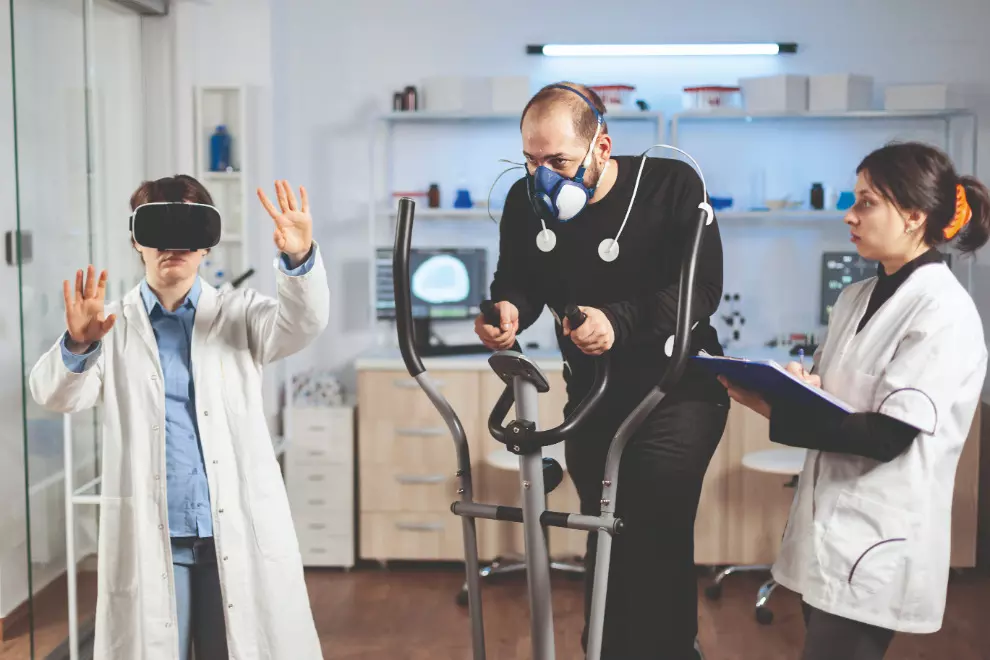
New Delhi, June 18 -- Imagine going to a doctor's clinic and getting diagnosed within minutes? No long waiting for lab reports, no second-guessing the diagnosis. Sounds futuristic? Well, with Artificial Intelligence (AI) in the picture, this is slowly becoming a reality. AI is shaking up the healthcare system like never before, making it smarter, faster and more personal.
From analysing X-rays to helping surgeons operate with precision, AI is now a real partner in hospitals and clinics across the world.
The story of AI in healthcare got serious attention when IBM launched its Watson supercomputer in 2011. This version was trained to read and understand medical language, helping doctors make better decisions. Today, major tech players like Microsoft, Apple and Amazon have jumped into the healthcare space, investing heavily in AI technologies.
By now, we all know that AI's biggest strength lies in scanning and reading through thousands of medical records in seconds.
Let's say a patient has chest pain. AI can instantly compare their ECG or scan results with millions of similar cases and flag a possible heart attack even before a doctor finishes reading the chart.
Take radiology for instance. Google's AI model has shown better accuracy than some radiologists in detecting breast cancer. In lung and skin cancer cases too, AI is helping detect the disease earlier by identifying patterns in scans that might escape the human eye. This early detection can be life-saving.
Another incredible branch of AI being used is called Natural Language Processing (NLP). It's what allows computers to "understand" doctor's notes, discharge summaries, prescriptions, basically anything written or said in medical language.
NLP can help doctors by pulling out relevant information from scattered patient records. Say someone visited three different hospitals in the past year. NLP can scan all those files and give the current doctor a clear view in seconds. It can even flag previous conditions, allergies, or risks the patient might not even remember.
In hospitals, administrative work takes up the maximum time. Imagine you have a patient in the emergency ward, but as a relative you need to fill up forms and do all the administrative work. This is where AI again wins. From filing insurance claims to scheduling appointments, these administrative tasks
eat up hours they could otherwise spend with patients. AI is stepping in to fix that. It can automate tasks like billing, processing lab results, and even answering routine patient queries. That means quicker services for patients and fewer errors in hospital systems. Plus, AI helps reduce fatigue for healthcare workers, letting them focus on what really matters: patient care.
Developing a new drug used to take years, if not decades. Now, AI can screen huge sets of biological and chemical data to suggest new treatment options faster. During the Covid-19 pandemic, AI helped researchers identify potential drugs much quicker than expected. It's also being used to repurpose existing drugs, finding out if a medication made for diabetes could also help in treating another disease, for example. This means faster and cheaper access to life-saving medicines.
AI-driven robotic arms are now being used in surgeries, especially in delicate procedures like neurosurgery or joint replacements. These machines offer surgeons better control and precision, often through smaller incisions. Surgeons can also use AI-powered simulations to practice before the actual surgery. It's like a virtual rehearsal before going live.
As promising as AI sounds, it's not without challenges. One major concern is data privacy. These systems collect sensitive health information. What happens if that data is misused? It's essential to have strong security in place. Another concern is accuracy and patient safety. If AI makes a wrong recommendation, who's accountable? That's why it's crucial for these systems to be transparent. Doctors need to understand how an AI tool reached a particular conclusion, so they can verify it and not just blindly follow.
And let's not forget the most human factor: trust. For doctors to rely on AI, they need to be confident that it's giving sound, evidence-based advice. Transparency and ongoing training will play a big role in building that trust.
AI will never replace doctors but it is making healthcare more responsive and precise. And if done right, it can lower costs, reduce burnout among medical staff and deliver better outcomes for patients.
AI steps into the lab
I n pathology, AI is proving to be a game-changer. It's being used to examine tissue samples with more precision than traditional microscopes. For example, when checking for cancer, AI can spot patterns in cells that point to whether a tumour is benign or malignant. It can also help grade how severe the cancer is. In fact, some pathology labs are already using AI to manage workflow, sorting through routine cases so that pathologists can spend more time on complex diagnoses.
Published by HT Digital Content Services with permission from Millennium Post.
